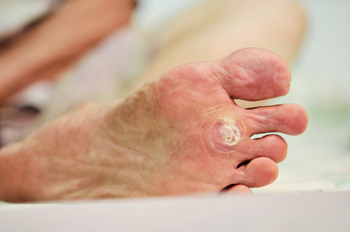
Plantar warts are small, rough growths that develop on the soles of the feet due to a viral infection. They are caused by the human papillomavirus, or HPV, which enters the skin through tiny cuts or abrasions. These warts often appear on weight-bearing areas, such as the heels or the balls of the feet, where pressure can cause them to grow inward, creating discomfort or pain while walking. The virus thrives in warm, moist environments, making public showers, around swimming pools, and locker rooms common places for exposure. People with weakened immune systems or frequent barefoot exposure to contaminated surfaces are at higher risk. Plantar warts can cause significant discomfort, and it may be difficult to complete daily activities. If you have developed this condition, it is suggested that you consult a podiatrist who can offer effective treatment solutions.
Plantar warts can be very uncomfortable. If you need your feet checked, contact One of our podiatrists from Foot and Ankle Medical Center. Our doctors will assist you with all of your foot and ankle needs.
About Plantar Warts
Plantar warts are the result of HPV, or human papillomavirus, getting into open wounds on the feet. They are mostly found on the heels or balls of the feet.
While plantar warts are generally harmless, those experiencing excessive pain or those suffering from diabetes or a compromised immune system require immediate medical care. Plantar warts are easily diagnosed, usually through scraping off a bit of rough skin or by getting a biopsy.
Symptoms
- Lesions on the bottom of your feet, usually rough and grainy
- Hard or thick callused spots
- Wart seeds, which are small clotted blood vessels that look like little black spots
- Pain, discomfort, or tenderness of your feet when walking or standing
Treatment
- Freezing
- Electric tool removal
- Laser Treatment
- Topical Creams (prescription only)
- Over-the-counter medications
To help prevent developing plantar warts, avoid walking barefoot over abrasive surfaces that can cause cuts or wounds for HPV to get into. Avoiding direct contact with other warts, as well as not picking or rubbing existing warts, can help prevent the further spread of plantar warts. However, if you think you have developed plantar warts, speak to your podiatrist. He or she can diagnose the warts on your feet and recommend the appropriate treatment options.
If you have any questions please feel free to contact our offices located in New Port Richey and Spring Hill, FL . We offer the newest diagnostic and treatment technologies for all your foot and ankle needs.
